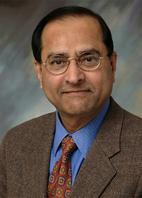Egyptian prime minister earned two Engineering degrees at Purdue
Sinha, the Edgar B. and Hedwig M. Olson Distinguished Professor of Civil Engineering, and the late E.J. Yoder were Sharaf's master's advisers. Sinha also was his doctoral adviser, and Sharaf did his post-doctoral work for Sinha.
Sharaf came to Purdue in 1978. He earned his master's and doctorate degrees in civil engineering and did post-doctoral work at Purdue.
Sharaf was last on campus in 2006, when he received the Distinguished Engineering Alumni award. “He brought his whole family with him,” Sinha said. “And he told his three sons that it all started at Purdue.”
At the time he returned to Purdue, Sharaf said: “I have to thank the great people I dealt with during my stay there. The special one for me is Professor K.C. Sinha. … Every time I get an award, I send an e-mail to Professor Sinha to congratulate him and tell him that he is my partner in winning it.”
Reacting to the news of Sharaf’s appointment, Arden Bement, director of the Global Policy Research Institute said he was delighted.
“It speaks well for Purdue’s international programs and one of our key strategic goals, which is to launch tomorrow’s leaders,” Bement said.
“It also speaks well for our goal to meet global challenges, and I would say that in my courses I do come in contact with students who I feel have great potential for high-level global leadership. In my view, it’s a great investment for the future of our shrinking world that at Purdue we continue to stress the importance of building a network of potential international leaders.”
While at Purdue, Sharaf devoted himself to the then-new research area of highway maintenance management. “Up to the mid-70s, most highway research was geared toward the design of new infrastructure,” Sharaf said. “Then, with the aging network and limited budget allocated to maintain the network at an appropriate and usable level, it was necessary to develop tools and methods that maximize the effect of the available budget.”
Sinha most recently saw Sharaf last year during a conference in Lisbon, Portugal.
While Sharaf has spent most of his career teaching, he also has worked in government, Sinha said. He was Egypt's transportation minister for a while.
“He is a man who can change things,” Sinha said. “He wants to advance the Arab world. In Egypt, he has been working for some time to encourage young people to go into science, technology, engineering and math.
“Sharaf is thoughtful, religious and progressive,” Sinha said. “He can set an example for the whole Middle East.”
Sinha said he is proud of Sharaf. “I am happy for him, but I'm also concerned. He is a good man, an honest man. But he has taken on a daunting task.”


